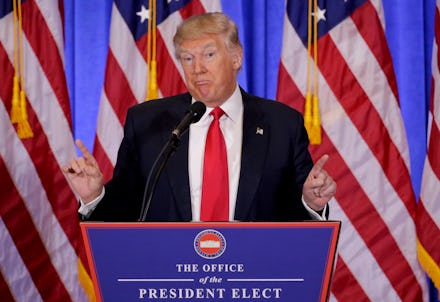How Trump could destroy global order by refusing to defend the Baltics

Over the last decade, the United States has fought insurgencies in both Afghanistan and Iraq and developed a lot of skill in counterinsurgency. The small Baltic state of Estonia, on the other hand, is training its citizens in insurgency. It is doing this because it is afraid of a Russian invasion and occupation, and with good reason. Russia has carried out cyberattacks against Estonia, kidnapped one of its citizens and increased its troop strength along the Estonia border. But Estonia might not feel such a level of anxiety were it not for the election of President Donald Trump, and his statements about NATO, which Estonia joined in 2004.
Article 5 of the NATO treaty states, "The Parties agree that an armed attack against one or more of them in Europe or North America shall be considered an attack against them all." During the presidential campaign, Trump repeatedly called the utility of NATO into question and specifically questioned the willingness of the U.S. to defend the Baltics. Trump has said that NATO was obsolete. Since his election, Trump has said he "strongly supports" NATO, but his relationship with Russia remains suspicious. The international order is more fragile that it seems. If Trump were to come out and say, "The U.S. will not defend the Baltic States," then the following scenarios could happen.
NATO would collapse
NATO is a collective security agreement. The entire premise is that "an attack on one is an attack on all." Trump thinks the U.S. military is the enforcer of a mafia protection-racket in which the U.S. only provides protection to states that pay up. The alliance itself is rooted in the credibility of its members' commitment. If the U.S. won't come to the defense of Estonia, why would Poland expect the U.S. to come to its defense? The other member states could form a new counter-Russia alliance, but that assumes they'd all be in agreement about standing against Russia.
Europe would fragment
The collapse of NATO, or even an American withdrawal from NATO, would result in a split between the NATO countries. There would be those that would bandwagon with Russia, and there would be others that would continue to attempt to balance against Russia. This split would not be on geographic lines and would continue the trend started by Brexit. There is a reason why Russia is supporting Marine Le Pen, and it isn't because they have France's best interest at heart.
South Korea and Japan would develop nuclear weapons
If the U.S. would not keep its commitment to NATO, why should Japan and South Korea believe that the U.S. would honor its defense treaties with its East Asian allies? The only way for these states to ensure their own survival against a North Korean attack would be to develop their own nuclear deterrent as quickly as possible. The Non-Proliferation Treaty would be dead, and the number of new nuclear states would likely increase beyond these two.
Israel and other Middle Eastern states would turn toward Russia
The U.S. does not have a formal treaty commitment to the defense of Israel or Saudi Arabia, but it does have decades-old friendships with both states. If the U.S. was not seen as a credible friend, these states would look to other powers for help in their lukewarm war with Iran. Israel has increased its ties with Russia in the last year due to the Obama administration's lack of credibility in the region.
The Philippines and Australia would turn toward China
These states also have mutual defense treaties with the U.S. They would also no longer be able to rely on an American defense commitment. This would be a bigger issue for the Philippines than for Australia and New Zealand, as it is currently in a dispute with China in the South China Sea, and it has already flirted with realigning towards China. Australia would move toward China as a result of the dissolution of TPP, rise of RCEP and Trump's odd antagonism toward Australia.
A post-liberal order would emerge
The United States-led alliance system has prevented major war in Europe for more than 70 years, on the Korean peninsula for more than 60 years and keeps global trade routes open and free. The global reorientation away from the U.S. and toward Russia and China would be a victory for illiberalism worldwide. It would result in a diminished U.S. and multipolarity by choice.
There are many ways Trump could disrupt, destroy or demolish the international order — saying he won't defend the Baltic States is just one of them.